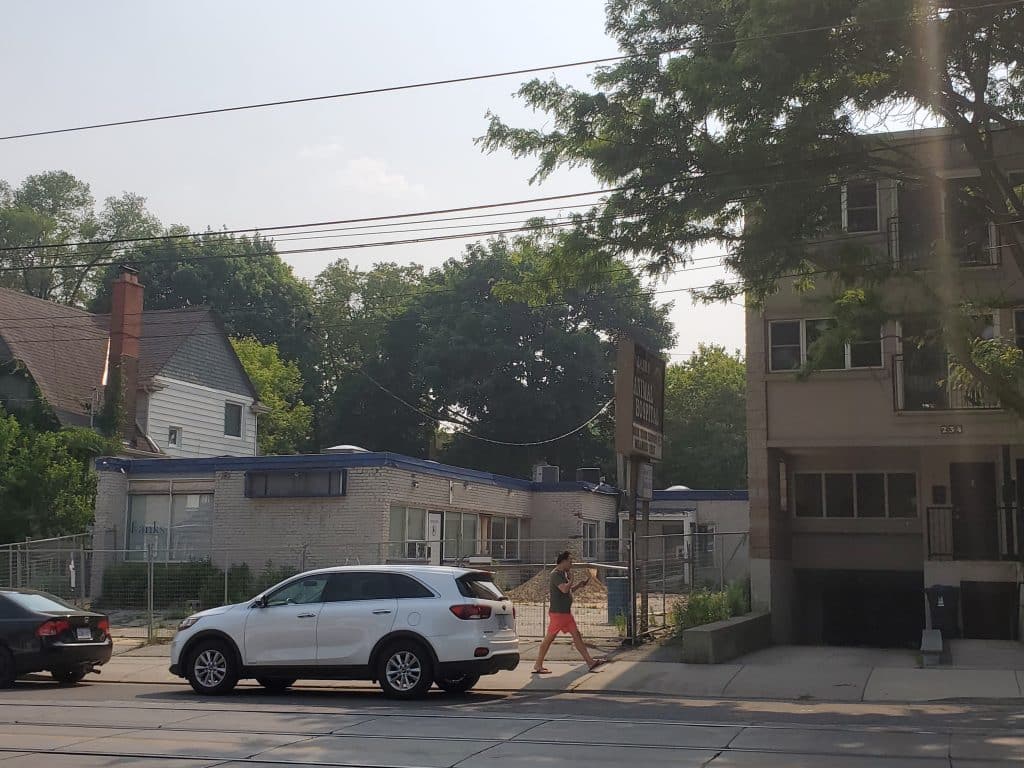Na Me Res native men’s residence, an organization that supports homeless Indigenous men in Toronto, has received approval for the building of affordable housing units along with backlash from the local community.
Na Me Res purchased the land at 230 Coxwell Ave. in 2021 with plans to build a four story 20 unit building. On May 31, a Toronto Committee of Adjustment was held in regards to ten zoning bylaw variances about the property. The zoning bylaws all concerned the height of the building, the lack of proposed parking, the distance of the building and windows from the street and lack of a bicycle maintenance area. All of the variances were approved by the committee.
At the committee meeting, local residents were allowed to voice their concerns. In the lead up to the committee, there were 11 letters of objections from people who live on Coxwell; ten of the residents then spoke to the committee.
While some residents agreed that affordable housing is important, concerns about the building itself were brought up. Publicly available letters voice numerous concerns such as lack of privacy and sunlight for their gardens due to the building’s height.
Other letters did not agree with the construction of the building. One resident started a petition that currently has over 70 signatures to stop the construction of the building. Another resident, in a public letter, brought up the safety of the children who live and go to school in the area.
“As parents, we have raised our three children in this house and had not seen much crime in this neighbourhood for the past 25 years,” wrote Yi Hua Peng and Guang Ming Zheng, nearby residents. “It is proven through research that Indigenous men experience higher rates of violence, crime, alcoholism and sexual assault. We simply cannot allow my nephews to be here when there can potentially be dangerous men living just three houses next door.”
These concerns are not new for Steve Teekens, director of Na Me Res. He says that whenever a committee of adjustment has happened, residents are worried regarding the safety of the neighborhood.
“Every time we have to go to committee we have to deal with this. We have to deal with residents who are angered we are there,” Teekens said. “It’s quite apparent when you watch the [May 31] committee on YouTube that residents are scared of our men.”
Na Me Res currently operates 38 units of affordable housing. Teekens says that receiving formal complaints for those units is rare and violent acts even more so. He says that a unit in CabbageTown in two years of operation has received three formal complaints from people who were against the unit when it went to committee.
Some residents also brought up concerns in two letters about the distance from the property from the local brewery. The letters from Matthew Kreher and Olivia Monk-Saigal, two other nearby residents, say they are worried regarding the rehabilitation of the potential Na Me Res residents.
“Putting this building directly next to a brewery does not seem like a helpful or wise approach for people that are trying to rehabilitate, in fact it does seem like a
preventable/obvious recipe for disaster, and I am confused by this property choice,” Kreher says in his letter.
Na Me Res does not build these properties for rehabilitation, says Teekens, adding that this is something Na Me Res addresses regularly.
“Every time I’ve had to deal with this. People speculate that all our guys are a bunch of drunks, that they won’t be working, that they will create an element of being negative on community safety. It has never been the case,” says Teekens.
Despite the pushback, Na Me Res received over 20 letters of support in the construction of this building. Many of the letters were from organizations such as United Way and the Native Women’s Resource Centre.
“The responsibility of this endeavour includes you and this city and we fully support the advancement of the Na me Res’ project and their leadership in housing Indigenous men in a good way,” writes Pamela Hart, executive director of Native Women’s Resource Centre.
The building is expected to take two years to finish construction.
Listen below for the CJRU story:









